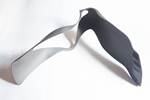CRP Technology obtains ISO 14001:2015 certification
3D printing company strengthens its industrial model by combining environmental sustainability, technological innovation and strict process control.
A gear formed with Windform XT 2.0 IMG. Source | CRP Technology
CRP Technology (Modena, Italy), a company known for its Windform range of fiber-reinforced materials for selective laser sintering (SLS) 3D printing, has obtained ISO 14001:2015 certification, confirming the company’s responsible and sustainable environmental management.
Issued by the DNV, this certification applies to the production of plastic components using SLS and the production of powders intended for SLS and other similar additive manufacturing processes. The certified activities fall under IAF code 15 (rubber and plastic products) and were assessed according to the requirements of Technical Regulation RT-09.
This new milestone adds to the EN 9100 certification already achieved by CRP Technology for its quality management system applied to the aerospace and defense sectors, further confirming the industrial model adopted by CRP Technology — one that combines technological innovation, rigorous process control, operational transparency and environmental responsibility.
CRP Technology's commitment to sustainability also takes shape through concrete circular economy projects, such as the recovery of Windform XT 2.0 powders (Windform XT 2.0 is a carbon fiber-reinforced nylon). Once no longer suitable for SLS 3D printing, the powders are reprocessed and converted into Windform XT 2.0 IMG, which can be used in injection molding or FDM/FFF 3D printing processes in pellet form.
Related Content
-
Combining multifunctional thermoplastic composites, additive manufacturing for next-gen airframe structures
The DOMMINIO project combines AFP with 3D printed gyroid cores, embedded SHM sensors and smart materials for induction-driven disassembly of parts at end of life.
-
Carbon fiber composite pallet revolutionizes freight industry
LOG Point Pallet fuses advanced materials with innovative design and manufacturing to improve supply chains worldwide.
-
Plant tour: Airbus, Illescas, Spain
Airbus’ Illescas facility, featuring highly automated composites processes for the A350 lower wing cover and one-piece Section 19 fuselage barrels, works toward production ramp-ups and next-generation aircraft.



